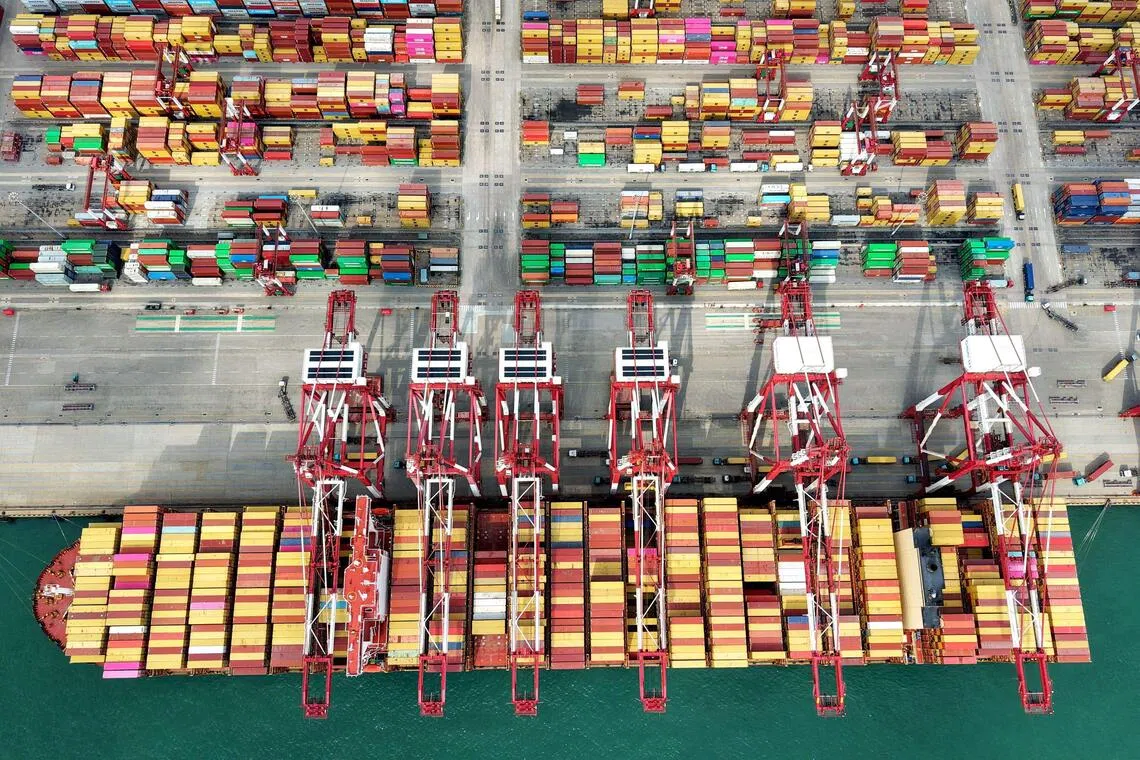China exports soar, giving Xi stronger hand in trade war with US
Sign up now: Get ST's newsletters delivered to your inbox

The strength of demand from export markets other than the US means China should be less affected by the further increase in tariffs threatened by Mr Trump.
PHOTO: AFP
Follow topic:
BEIJING - Chinese shipments overseas grew at their fastest pace in six months, far exceeding forecasts, in a sign of resilience that is giving Beijing a stronger hand in the latest trade war with the United States.
Exports rose 8.3 per cent in September from a year earlier, according to data from the General Administration of Customs on Oct 13.
That was faster than the 6.6 per cent median estimate in a Bloomberg survey of economists, and shows there is no slowdown yet in the record-breaking flood of goods leaving China’s shores.
Shipments to the US plunged 27 per cent – the sixth month of double-digit declines – a slump more than offset by strong growth in sales to regions like the European Union.
Exports to the EU rose by more than 14 per cent, the most in over three years, and those to the 10-nation South-east Asian trading grouping grew almost 16 per cent.
“China’s exports have remained resilient despite US tariffs, thanks to a diversified export market and strong competitiveness,” said Ms Michelle Lam, Greater China economist at Societe Generale.
“The limited impact from US tariffs on overall trade so far has likely emboldened China to take a tougher stance on US-China trade negotiations.”
Companies have responded to higher US tariffs by trying to seek out alternative markets or routing goods indirectly to the world’s biggest economy.
The strength of demand from markets other than the US means that Chinese firms should be less affected by the further increase in tariffs threatened by US President Donald Trump.
Higher sales overseas are also providing a boost to a domestic economy in deflation and still struggling to reverse a decline in housing demand and prices.
China is set to announce third-quarter data for economic activity on Oct 20, with most analysts predicting a slowdown from the first half of the year.
Still, a strong showing in the first two quarters all but ensures China will reach the official growth target of around 5 per cent.
Bloomberg Economics analysts Chang Shu and David Qu said: “Trade talks are entering a turbulent new phase. The path to any deal is now long and narrow. The US can now focus more on China, having reached trade deals with other major economies. Both sides are armed for escalation.”
Imports grew 7.4 per cent in September, far more than forecast, leaving a surplus of US$90.5 billion (S$117.5 billion).
“The current external environment remains grim and complex,” Mr Wang Jun, deputy head of the customs authority, told reporters in Beijing.
“Foreign trade faces rising uncertainty and difficulties. Taking into consideration a high base from last year, we need hard work to stabilise trade development in the fourth quarter.”
China unveiled wide-ranging global export controls on products containing even traces of certain rare earths last week, prompting Mr Trump to fire back by threatening to cancel a planned in-person meeting with Chinese President Xi Jinping – their first in six years.
The US leader also announced plans to put an additional 100 per cent tariff on Chinese goods, along with sweeping curbs on “any and all critical software”.
The Trump administration later signalled openness to a deal with China to quell fresh trade tensions, while also warning that recent export controls announced by Beijing were a major barrier to talks.
Bloomberg Economics estimates that a 100 per cent US tariff hike would lift effective rates on Chinese goods to around 140 per cent – a level that shuts down trade.
While the current rate is 25 percentage points above the world average, China’s dominance of manufacturing has kept its exports flowing.
But the limited exposure to the US of China’s fastest-growing exports – ranging from lithium batteries to ships and electric vehicles – should make it easier for Beijing to contain any further disruption in trade, according to Mr Lynn Song, chief Greater China economist at ING Bank.
“So far this year, China has shown that while it does not wish for a trade war, it is willing to retaliate to escalations as needed,” he said.
“The export resilience will likely strengthen confidence in this approach ahead of the talks later this month.” BLOOMBERG

